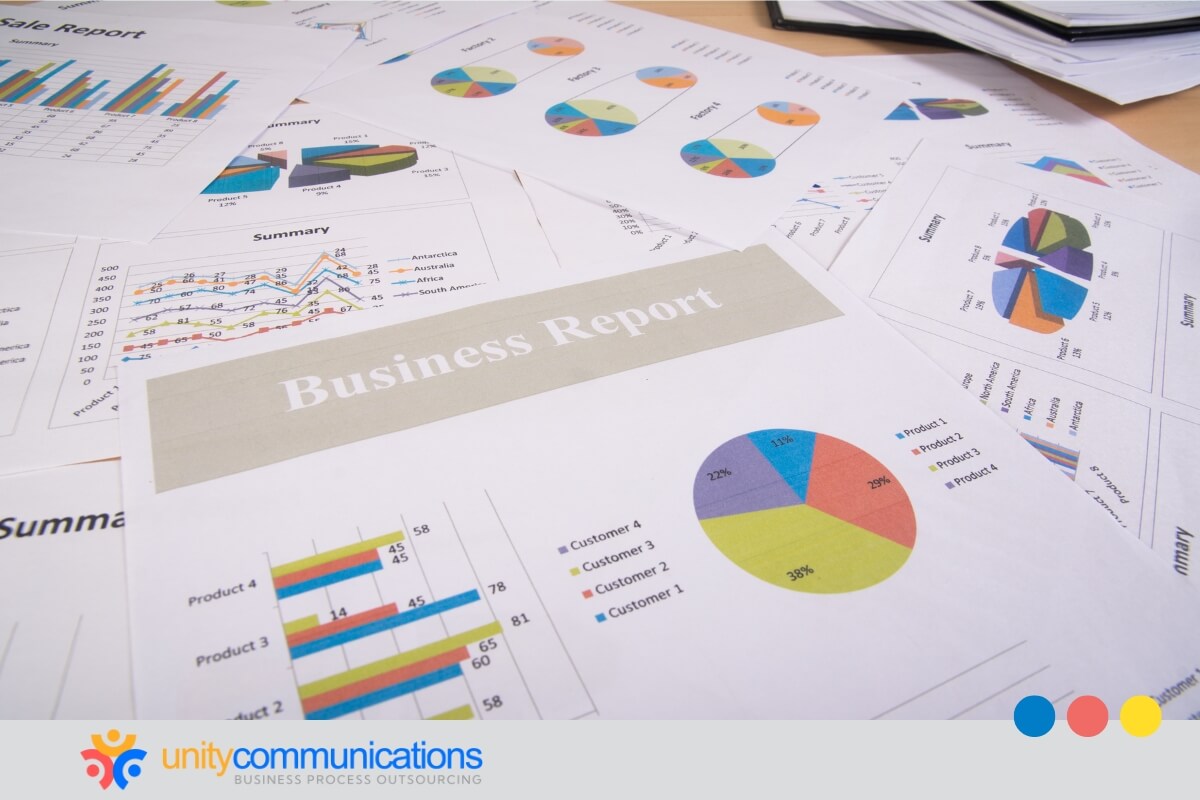IN THIS ARTICLE
Table of Contents
Artificial intelligence (AI) revolutionizes how companies approach outsourcing, efficiency, and decision-making. AI agents are no longer futuristic concepts but everyday partners in business operations. From improving workflows to enhancing accuracy, they support critical functions across industries.
When paired with business process outsourcing (BPO), AI agents empower small and medium-sized businesses (SMBs) to scale smarter and faster. Understanding the functions of an AI agent reveals why these 10 roles are essential for driving growth and efficiency.
What is the function of an AI agent?

You might ask, “What does an AI agent do”? An AI agent acts on behalf of your company by performing tasks intelligently and independently.
Simply put, an AI agent is a digital assistant that perceives information, reasons through it, and executes actions aligned with business objectives. For SMBs, AI agents:
- Reduce repetitive workloads.
- Increase accuracy.
- Accelerate service delivery in outsourced operations.
They bridge automation with decision-making. They analyze data, adapt to changing conditions, and support continuous improvement. Understanding these capabilities sets the stage for exploring their key roles that drive real business impact.
10 critical roles of AI agents
Building on the AI agent definition, these functions show how your intelligent technology can execute tasks, analyze data, plan goals, and support outsourcing processes. Understanding them helps you maximize efficiency, accuracy, and growth.
1. Execute tasks autonomously
AI agents perform tasks independently, reducing the need for human intervention and streamlining operations. They automate repetitive processes, improving efficiency and lowering costs. The global AI agents market is projected to reach $236 billion by 2034, highlighting their rapid adoption and growth.
Robotic process automation (RPA) powers this autonomous capability. It enables AI agents to handle rule-based tasks efficiently. By automating routine processes, RPA lets your team focus on higher-value activities that drive growth and efficiency.
Key benefits:
- Continuous productivity: Operates 24/7 without interruptions
- Enhanced accuracy: Minimizes human errors in repetitive tasks
- Cost savings: Reduces operational expenses
- Scalability: Easily adjusts to increasing workloads
Understanding the function of an AI agent shows how autonomous execution drives efficiency, innovation, and measurable impact across business operations.
2. Break down tasks and orchestrate workflows
AI agents excel at decomposing complex processes into manageable tasks and coordinating them. With this feature, you can streamline operations, lower bottlenecks, and enhance productivity. Learning what the function of an AI agent is in workflow orchestration helps you see how it complements outsourced processes and aligns with business goals.
AI agents can support BPO functions by managing task allocation and sequential execution in back-office or customer-facing operations. This connects intelligent orchestration directly to practical outsourcing benefits.
Key benefits:
- Improved efficiency: Automates multi-step processes without manual intervention
- Clear accountability: Assigns tasks systematically, reducing errors
- Faster turnaround: Coordinates multiple operations simultaneously to meet deadlines
- Enhanced visibility: Tracks progress across workflows, supporting better decision-making
AI agents orchestrate tasks so your team can focus on high-priority work while keeping outsourced processes smooth and reliable.
3. Perceive and interpret environmental data
AI agents can sense and analyze data from multiple sources, allowing your business to respond quickly to changing operational surroundings and conditions. Understanding the function of an AI agent in perception helps you leverage real-time insights and make informed decisions.
This capability is valuable in BPO in data science, where AI agents can process large datasets, identify patterns, extract insights, and provide actionable recommendations for outsourced processes.
Key benefits:
- Data-driven decisions: Interprets customer interactions and operational metrics instantly
- Predictive insights: Spots trends before they impact performance and profitability
- Enhanced accuracy: Reduces errors by analyzing complex datasets automatically
- Operational efficiency: Streamlines workflows with real-time intelligence
By perceiving and interpreting environmental data, AI agents provide your team with a clearer understanding of workflows and customer needs, supporting smarter, faster, and more reliable outsourced operations.
4. Plan and achieve business goals
AI agents help align daily operations with broader business objectives by efficiently mapping tasks and timelines. Knowing the function of an AI agent in goal planning lets you prioritize initiatives and measure progress.
According to IBM, AI’s contribution to revenue growth is expected to increase 133% between 2023 and 2027. This highlights the strategic value of integrating AI into planning and decision-making.
Key benefits:
- Strategic alignment: Links operational tasks with company objectives
- Performance tracking: Monitors key performance indicators (KPIs) or metrics, and progress automatically
- Risk mitigation: Anticipates challenges before they escalate
AI agents guide your team toward faster goal achievement while supporting long-term strategic planning.
5. Make smart decisions using logic and learning
AI agents analyze data, detect patterns, and apply reasoning to support faster, more accurate business decisions. This capability enables your team to respond efficiently to operational challenges and capitalize on emerging opportunities.
This decision-making power becomes even more effective when AI agents leverage machine learning (ML) in outsourced operations, continuously improving outcomes based on past and real-time data.
The role of ML in BPO allows AI agents to refine decision-making models, adapt strategies, and provide actionable insights for operations, customer service, and back-office processes.
Key benefits:
- Enhanced accuracy: Improves precision in repetitive and complex tasks
- Faster response: Adapts to changing business conditions in real time
- Data-driven planning: Generates actionable recommendations for strategic initiatives
- Reduced errors: Decreases operational mistakes through predictive analytics
- Optimized performance: Maintains consistent quality across outsourced workflows
Understanding the function of an AI agent in this context helps you apply these insights effectively and improve operational efficiency.
6. Integrate with tools, applications, and data sources
Another function of an AI agent is to connect with software, applications, and data sources, thereby unifying operations and maintaining smooth workflows. This integration allows you to access platform information without manual intervention, elevating efficiency and decision-making.
Application programming interfaces (APIs) power this integration. With them, AI agents can exchange data and synchronize tasks between systems. With cloud-based solutions for business growth through outsourcing, AI agents help your team scale operations and react quickly to changing business needs.
Key benefits:
- Streamlined workflows: Synchronizes tools and data for consistent operations
- Immediate insights: Accesses and analyzes information instantly
- Automated notifications: Keeps teams updated on critical changes
- Aligned tasks: Reduces errors by coordinating system activities
By connecting tools, applications, and data sources, AI agents deliver more efficient and scalable operations.
7. Collaborate within teams and systems
AI agents facilitate effortless collaboration within teams and across systems, allowing your enterprise to coordinate projects efficiently. Sharing updates and aligning tasks allows your team to focus on the main goals and avoid miscommunication.
AI agents adapt to different team structures, helping you manage dedicated vs. shared agents in BPO operations.
Key benefits:
- Coordinated workflows: Aligns team activities for consistent outcomes
- Instant communication: Shares updates and alerts in real time
- Synchronized cross-system: Connects multiple platforms efficiently
- Optimized resources: Assigns tasks according to workload and availability
- Enhanced accountability: Tracks contributions and progress continuously
By collaborating effectively, AI agents help your team achieve operational efficiency and stronger outcomes across internal and outsourced functions.
8. Retain context and learn over time
AI agents store and interpret historical and ongoing interactions so your team can maintain context and act consistently across tasks. This memory streamlines operations, prevents repeated errors, and improves decision-making over time.
According to a Gartner report, over 40% of agentic AI projects are expected to be discontinued by 2027 because of rising costs and uncertain returns on investment. This highlights the need for AI systems that learn and adjust efficiently, which shows the importance of understanding how AI agents retain and apply knowledge.
Key benefits:
- Continuous improvement: Enhances operations through iterative learning
- Consistent context: Maintains uniformity across customer and operational interactions
- Insightful patterns: Detects trends to guide smarter actions and decision-making
- Preserved knowledge: Retains valuable insights for future tasks
By retaining context and learning, AI agents support reliable, efficient, intelligent outsourced processes.
9. Adapt and improve processes continuously
AI agents monitor workflows and performance metrics to spot inefficiencies and immediately adapt processes. Adjusting automatically allows your team to respond quickly to operational changes and maintain smooth BPO operations. Understanding the function of an AI agent in continuous improvement helps you leverage ongoing enhancements for lasting impact.
Key benefits:
- Proactive adjustments: Detects issues and optimizes workflows dynamically
- Efficient iterations: Applies small changes continuously to improve performance
- Predictive enhancements: Anticipates challenges and addresses them before they affect operations
- Consistent quality: Maintains high standards across customer interactions and internal processes
- Data-driven insights: Uses real-time analytics to refine operations continuously
By learning from past outcomes and refining workflows, AI agents reduce errors, enhance efficiency, and improve responsiveness. Your company can optimize performance continuously while maximizing the value of outsourced processes and resources.
10. Maintain security and compliance controls
AI agents help enforce data protection, compliance, and governance across operations. In 2024 alone, U.S. agencies introduced 59 new AI-related regulations, more than double the previous year, underscoring the growing need for security oversight. Understanding BPO security threats is critical to maintaining operational integrity and trust.
AI agents monitor workflows, detect anomalies, and prevent unauthorized access to prevent data breaches.
Key benefits:
- Activity monitoring: Identifies and responds to unusual activities promptly
- Access control: Manages permissions across systems securely
- Regulatory compliance: Maintains alignment with evolving legal standards
- Data encryption: Protects information at rest and in transit
- Audit trails: Keeps detailed logs for accountability and reporting
By maintaining robust security and compliance controls, AI agents help your team protect data, reduce risk, and sustain reliable, legally compliant outsourced processes.
Use AI agents to optimize outsourcing operations

AI agents enhance how businesses use outsourced operations, making processes faster and more accurate. For SMBs, this means maximizing operational efficiency while maintaining service quality.
Discover the advantages below:
Streamlined task management
By understanding what BPO is, you see how outsourcing transfers repetitive or administrative tasks to specialized providers. Pairing this with AI agents ensures consistency and reduces human error.
Improved workflow intelligence
How outsourcing works is elevated when AI agents orchestrate task sequences, prioritize activities, and monitor performance. Your team gains actionable insights without adding extra staff.
Hybrid human-AI collaboration
AI and BPO combine to provide flexible models where AI handles volume-driven work and humans focus on nuanced or confidential tasks. This maintains trust while increasing efficiency.
Operational efficiency
Recognizing BPO advantages helps you target cost savings, faster response times, and higher-quality outcomes through intelligent automation.
Scalable solutions
BPO for small businesses means accessing enterprise-level capabilities without hiring full-time personnel. AI agents scale operations to meet growth without inflating overhead.
Data-driven improvements
Integrating outsourcing and artificial intelligence allows real-time insights, predictive analytics, and continuous optimization across processes. When you know AI agent roles, you can apply these systems strategically, align automation with goals, and boost resource allocation.
Cloud integration support
AI agents connect outsourced workflows with cloud platforms, enabling seamless scalability, remote collaboration, and resilience.
By leveraging AI agent roles in outsourcing, you can enhance service quality, improve operational agility, and gain measurable efficiency gains without adding headcount.
The bottom line

AI agents are redefining how businesses approach outsourcing and automation. Understanding their core functions helps you see them as tools and strategic partners for scaling operations.
The right combination of BPO services and AI agents enhances decision-making, streamlines workflows, and delivers measurable results.
Ready to make your outsourcing smarter? Let’s connect.





